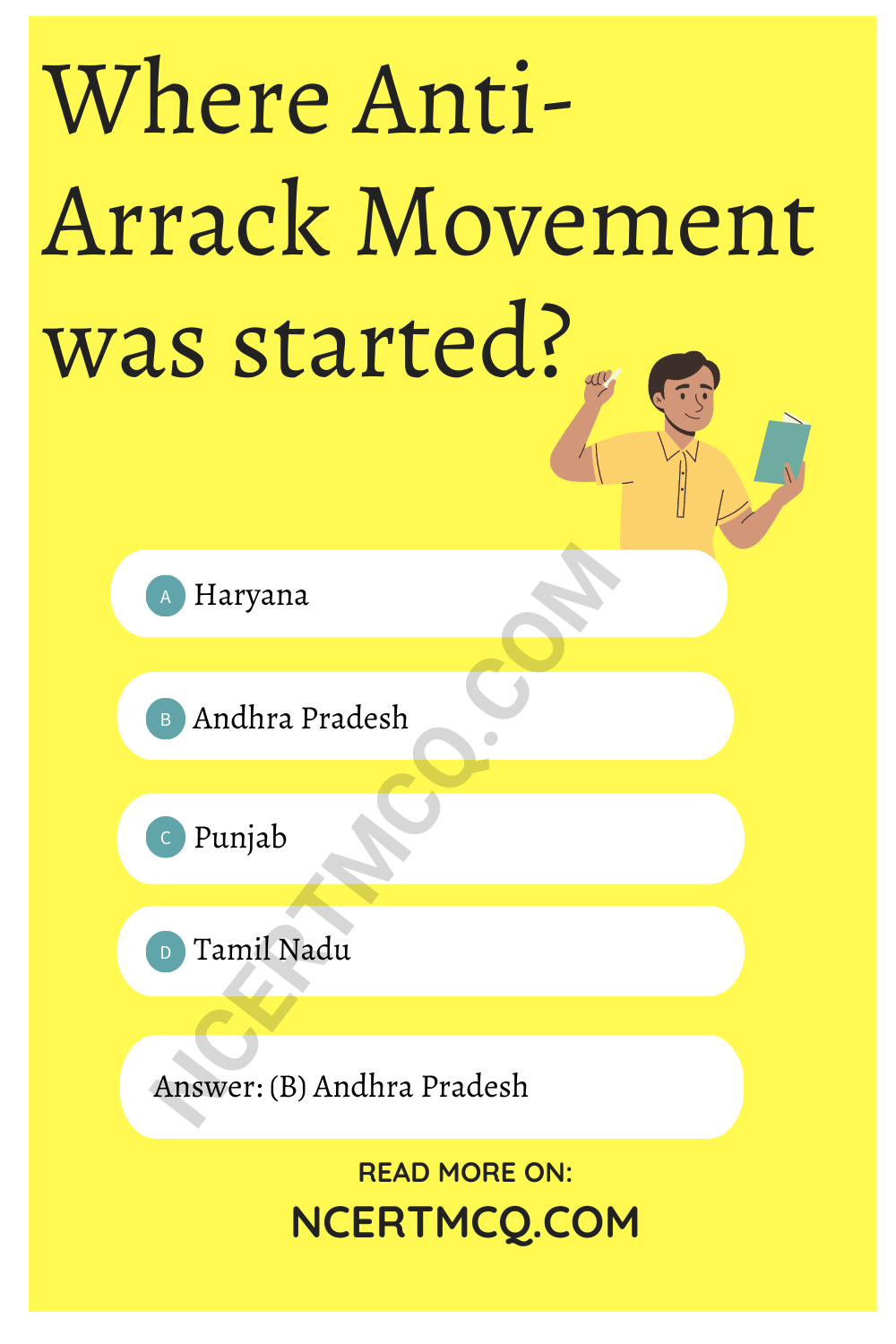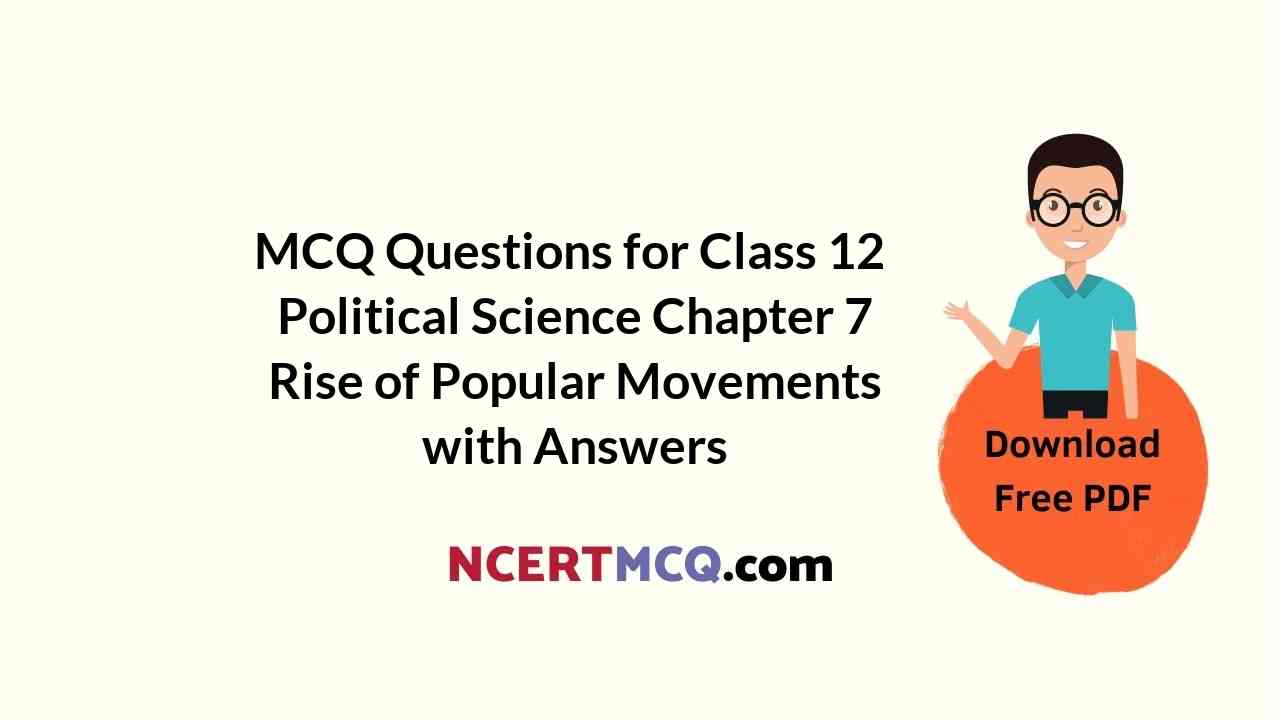Check the below NCERT MCQ Questions for Class 12 Political Science Chapter 7 Rise of Popular Movements with Answers Pdf free download. MCQ Questions for Class 12 Political Science with Answers were prepared based on the latest exam pattern. We have provided Rise of Popular Movements Class 12 Political Science MCQs Questions with Answers to help students understand the concept very well.
Class 12 Political Science Chapter 7 Rise of Popular Movements MCQ With Answers
Political Science Class 12 Chapter 7 MCQs On Rise of Popular Movements
Question 1.
Which of these statements are incorrect?
The Chipko Movement:
(a) was an environmental movement to prevent the cutting down of trees.
(b) raised questions of ecological and economic exploitations.
(c) was a movement against alcoholism started by women.
(d) demanded that local communities should have control over their natural resources.
Answer
Answer: (c) was a movement against alcoholism started by women.
Question 2.
In which year All India Kisan Sabha was established?
(a) 1930
(b) 1936
(c) 1940
(d) 1950
Answer
Answer: (b) 1936
Question 3.
Who led the Narmada Bachao Andolan?
(a) Medha Patkar
(b) Rajni Sharma
(c) Shabana Azmi
(d) Meira Kumar
Answer
Answer: (a) Medha Patkar
Question 4.
Where Anti-Arrack Movement was started?
(a) Haryana
(b) Andhra Pradesh
(e) Punjab
(d) Tamil Nadu
Answer
Answer: (b) Andhra Pradesh

Question 5.
Some of the statements below are incorrect. Identify the incorrect statements and rewrite those with necessary corrections.
(a) Social movements are hampering the functioning of India’s democracy.
(b) The main strength of social movements lies in their mass base across social sections.
(c) Social movements in India emerged because there were many issues that political parties did not address.
Answer
Answer: (a) Social movements are not hampering the functioning of India’s democracy.
(b) The main strength of social movements lies in their mass base across social sections.
(c) There were many issues that emerged in India because political parties did not address the social movements.
Question 6.
What is Narmada Bachao Aandolan?
Answer
Answer: Narmada Bachao Andolan is a movement to save River Narmada.
Question 7.
Who led the Narmada Bachao Aandolan?
Answer
Answer: Medha Patkar led the Narmada Bachao Andolan.
Question 8.
Where Anti-Arrack Movement was started?
Answer
Answer: Anti-Arrack Movement was started in Andhra Pradesh.
Question 9.
Where did Chipko Movement begin?
Answer
Answer: Chipko Movement began in two or three villages of Uttarakhand.
Question 10.
Mention one feature of the Chipko Movement.
Answer
Answer: Women’s active participation in the Chipko agitation was a novel feature of the Chipko Movement.
Question 11.
Where and when Dalit Panthers was formed?
Answer
Answer: Dalit Panthers was formed in Maharashtra in 1972.
Question 12.
What was the main demand of Dalit Panthers?
Answer
Answer: Effective implementation of reservation policy and social justice was the main demand of Dalit Panthers.
Question 13.
What was the method of action of Dalit Panthers?
Answer
Answer: Dalit Panthers resorted to mass action for the assertion of Ekilit rights.
Question 14.
To which state Shetkari Sanghathan belongs?
Answer
Answer: Shetkari Sanghathan belongs to Maharashtra.
We hope the given NCERT MCQ Questions for Class 12 Political Science Chapter 7 Rise of Popular Movements with Answers Pdf free download will help you. If you have any queries regarding CBSE Class 12 Political Science Rise of Popular Movements MCQs Multiple Choice Questions with Answers, drop a comment below and we will get back to you soon.
Class 12 Political Science with Answers MCQ:
- Challenges of Nation Building Class 12 MCQ
- Era of One Party Dominance Class 12 MCQ
- Politics of Planned Development Class 12 MCQ
- India’s External Relations Class 12 MCQ
- Challenges to and Restoration of Congress System Class 12 MCQ
- The Crisis of Democratic Order Class 12 MCQ
- Rise of Popular Movements Class 12 MCQ
- Regional Aspirations Class 12 MCQ
- Recent Developments in Indian Politics Class 12 MCQ
